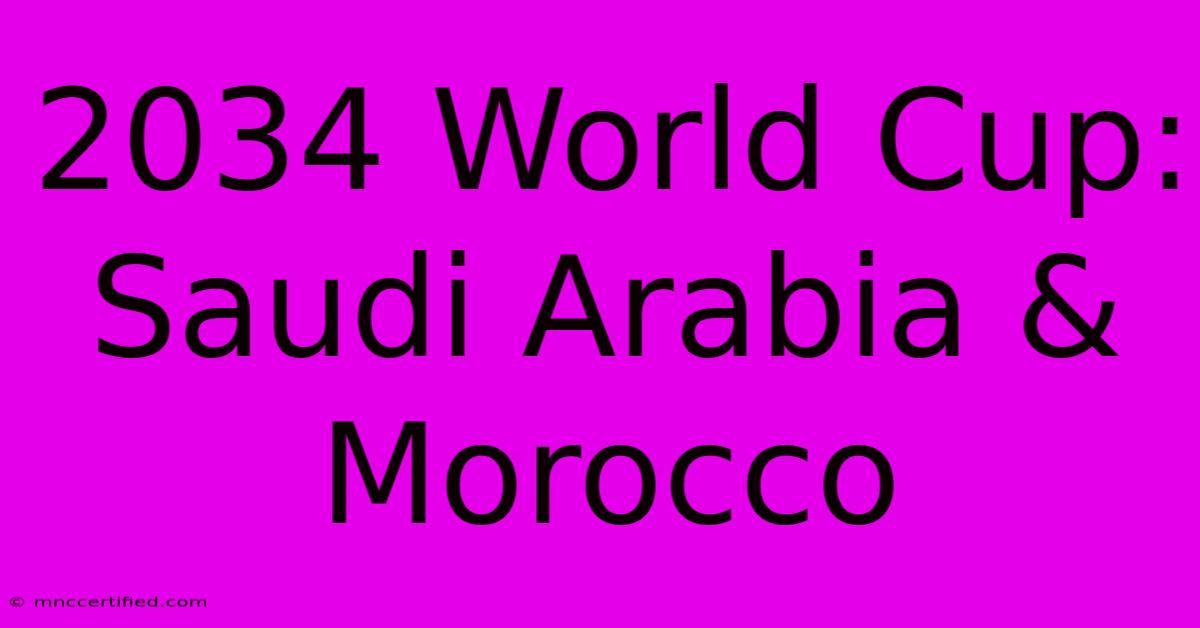2034 World Cup: Saudi Arabia & Morocco

Table of Contents
2034 World Cup: Saudi Arabia & Morocco – A Joint Bid with Giant Potential
The 2034 FIFA World Cup is already generating significant buzz, and the joint bid from Saudi Arabia and Morocco presents a compelling case for hosting this prestigious tournament. This article delves into the strengths and potential challenges of this ambitious bid, examining the infrastructure, footballing passion, and geopolitical implications.
A Powerful Partnership: Combining Strengths
Saudi Arabia and Morocco boast unique strengths that, when combined, create a formidable bid. Saudi Arabia's vast financial resources and commitment to developing world-class sporting infrastructure are undeniable assets. Their ambitious Vision 2030 plan explicitly includes boosting sports tourism, and hosting the World Cup perfectly aligns with this vision. Meanwhile, Morocco's proven experience in hosting major international events, including the 2022 Club World Cup and previous World Cup bids, offers invaluable logistical expertise and a well-established sporting culture. This partnership leverages the best of both nations.
Infrastructure and Logistics: Ready to Host the World?
Saudi Arabia is currently undergoing a massive infrastructure development program. New stadiums, state-of-the-art training facilities, and improved transportation networks are rapidly being built. This proactive approach ensures the country would be well-prepared to host a smooth and efficient World Cup. Morocco, having already invested significantly in its sporting infrastructure, further enhances the bid's capabilities. The combined infrastructure would likely surpass many previous World Cup hosts in terms of capacity and modernity. The potential for sustainable infrastructure is another key selling point, given the growing global focus on environmental responsibility.
Footballing Passion: A Shared Love of the Game
Both Saudi Arabia and Morocco possess a passionate and rapidly growing football fanbase. The recent successes of Saudi Arabian clubs in attracting global superstars and the consistent strong performances of the Moroccan national team demonstrate the region's burgeoning footballing culture. A joint bid allows them to tap into this shared enthusiasm, creating an electrifying atmosphere for players and spectators alike. The cultural exchange between the two nations, during the tournament, would also provide a unique and enriching experience for fans worldwide.
Challenges and Considerations: Potential Hurdles
While the joint bid presents numerous advantages, potential challenges must be acknowledged. Concerns surrounding human rights and social reforms in Saudi Arabia are likely to be scrutinized by FIFA. Transparency and commitment to addressing these concerns will be crucial for the bid's success. Further, ensuring smooth logistical coordination between two countries with different administrative systems requires careful planning and collaboration. Managing the potential security implications of hosting such a large-scale event in a politically sensitive region is also paramount.
The Geopolitical Landscape: Navigating Complexities
The geopolitical landscape plays a significant role in the bid's success. The partnership between Saudi Arabia and Morocco represents a unique opportunity for regional cooperation and stability. However, the bid will inevitably be assessed within the context of broader global relations. Demonstrating the bid's potential for positive diplomatic impact and showcasing the region's commitment to peaceful engagement will be important.
Conclusion: A Bold Vision for the Future
The Saudi Arabia and Morocco joint bid for the 2034 World Cup is a bold and ambitious undertaking. It offers a unique opportunity to showcase the transformative potential of the region and deliver a memorable World Cup experience. Addressing the potential challenges and highlighting the synergy between the two nations will be key to convincing FIFA that their bid is not only viable but also transformative for the future of football. The success of this bid would not only be a victory for Saudi Arabia and Morocco but also a testament to the unifying power of sport on a global scale. The coming years will be critical in observing the progress of their infrastructure development and social reforms as FIFA evaluates the bid.

Thank you for visiting our website wich cover about 2034 World Cup: Saudi Arabia & Morocco. We hope the information provided has been useful to you. Feel free to contact us if you have any questions or need further assistance. See you next time and dont miss to bookmark.
Featured Posts
-
Kentucky Vs Louisville Basketball How To Watch
Dec 12, 2024
-
Selena Gomez Announces Engagement
Dec 12, 2024
-
Megan Fox Mgk Split The Details
Dec 12, 2024
-
Supporting Megan Fox An Unlikely Ally
Dec 12, 2024
-
Car Crash In Aughton One Dead Three Critical
Dec 12, 2024